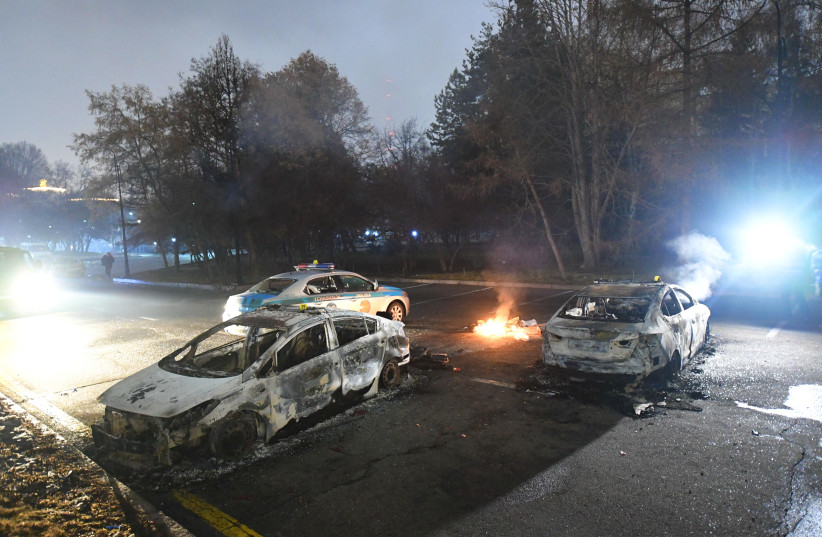Protests sweeping Kazakhstan will be closely watched by Iran and Turkey, and Russia may intervene. China also will want to monitor closely the developments in Kazakhstan because it affects China’s policies in Central Asia.
In the wake of the US leaving Afghanistan, there is a sense that the US role in Central Asia could be in decline and authoritarian regimes will want to make sure that no instability spreads from Kazakhstan.
Video from Kazakhstan has shown protesters sweeping the capital. According to reports Kazakhstan's President Kassym-Jomart Tokayev said Thursday he had appealed to Moscow for support and has condemned the protesters as “terrorists.”
Media in Turkey, Iran, China and Russia have downplayed the protests. TRT in Turkey, a state media channel, said “the Central Asian country has been rocked by protests since the start of the year over a New Year fuel price hike that on Wednesday escalated into protesters clashing with police and storming government buildings.” The report says that Tokayev had “appealed to the heads of CSTO (Collective Security Treaty Organisation) states to assist Kazakhstan.”
A state of emergency is now in place in Almaty and other areas. Russia has warned against “foreign” interference. This appears to be a message to the US and the West. Chinese media hasn’t said much about the protests. Chinese President Xi Jinping recently exchanged congratulations with his Kyrgyz counterpart, Sadyr Zhaparov on the 30th anniversary of diplomatic ties between the two countries.

Meanwhile, TASS media in Russia says that Kazakhstan’s President Kassym-Jomart Tokayev in a televised address to the nation vowed to stay in the capital no matter what. "No matter what, I will stay in the capital. This is my duty under the Constitution to be together with the people. We will overcome this dark period in Kazakhstan’s history. We will come out of it being strong," Tokayev said.
The protests in Kazakhstan are important and could influence central Asia as well as other countries around Russia. Protests have occurred in other countries where Russia has interests, such as Belarus in 2020 and 2021. In addition, Russia and the US have increased tensions over Ukraine. Meanwhile, Turkey has been cracking down on opposition protests and Iran has crushed protests over the last several years. The Taliban in Afghanistan are crushing minorities. Protests in Armenia have also challenged the president. In April 2021, clashes took place over a disputed section of the border between Kyrgyzstan and Tajikistan.
All of this is important because Kazakhstan is important to Moscow and it could be of vital importance to China. The Atlantic said in 2019 that “China has become the largest investor in Central Asia, and its patronage has been embraced by local governments, especially in Kazakhstan, where Xi announced Belt and Road Initiative in 2013.”
Kyrgyzstan and Tajikistan have played host to important confabs such as CICA and the SCO that have included talking points by Russia, China, Pakistan and others that challenge Washington’s hegemony and cement a new world order.
“Russia has supported the construction of the Uzbek-Afghanistan-Pakistan railway (Mazar-e-Sharif-Kabul-Peshawar), which is seen as a competitor and alternative to the North-South international transport corridor, in which Iran and Russia also participate,” Iranian media said last year.
In April last year, Turkey’s Anadolu noted: “Russia prefers that China’s Belt and Road Initiative (BRI) should pass through its territory to attract the infrastructure investments and seek sizable share in the form of transit from trade moving from China to Europe and vice versa. This is one of the reasons for the renewal of the trans-Siberian railway and road project. Another expectation on Russia’s part is that the Chinese goods that will arrive in Kazakhstan heading to Europe should pass through its territory using the northern route instead of the southern route.” Iran is also looking for new deals with Turkmenistan, bordering Kazakhstan.
In short, a lot of countries have an interest in what happens next in Kazakhstan. Unrest and protests will lead Russia, China, Iran and Turkey to take a keen interest and be wary of any sense that protests might spread to neighboring states.
